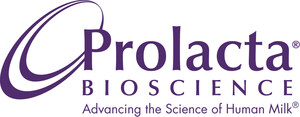Initial Patient Dosed in Phase 2a Clinical Trial Evaluating First-in-Class Human Milk-Based Therapy in Patients Undergoing Stem Cell Transplantation for Blood Cancers
Seeking strategic partners for continued clinical development of PBCLN-010 with PBCLN-014, a lead investigational therapy comprising human milk sugars and gut bacteria found in nursing infants
Recently published data demonstrated the human milk-based treatment can safely and predictably control gut microbiome in healthy adult subjects without use of antibiotics
DUARTE, Calif., Nov. 10, 2023 /PRNewswire/ -- In a breakthrough for human milk science, researchers at City of Hope, Los Angeles, have dosed the first patient in a Phase 2a clinical trial evaluating a novel therapy for blood cancer patients undergoing allogeneic hematopoietic stem cell transplantation. The investigational treatment, PBCLN-010 in combination with PBCLN-014, combines human milk sugars with a strain of bacteria found in the gut of nursing infants.
"Previous clinical trials of PBCLN-010 + PBCLN-014 have shown that it can safely and predictably control the gut microbiome in healthy adults," said Greg McKenzie, PhD, VP Product Innovation, Prolacta Bioscience. "Stem cell transplant patients endure extreme health challenges, and we believe this therapy may provide a positive impact with safe, effective microbiome restoration, which could help improve outcomes of these critically ill patients."
The randomized, open label, multicenter Phase 2a trial will evaluate the feasibility, efficacy, and safety of oral administration of PBCLN-010 (human milk oligosaccharides [HMOs]) in combination with PBCLN-014 (Bifidobacterium longum subspecies infantis [B. infantis]) in adult patients with blood cancers undergoing stem cell transplantation. The trial will evaluate how well B. infantis becomes part of the gut microbiome, as well as measure other changes in the microbiome over the course of six months, compared with current standard of care. Researchers will also monitor changes in biomarkers that may predict better patient outcomes.
"Patients undergoing stem cell transplant often have disruptions in their gut microbiome, including an increase in potentially disease-causing pathogens and an overall loss of diversity. This leaves patients prone to opportunistic infections and graft-versus-host disease, which can result in multi-organ attack and death. This Phase 2a study will measure how well the human milk-based therapy helps establish a healthy microbiome in patients with blood cancers, like it does naturally in the newborn gut," said Karamjeet Sandhu, M.D., assistant professor, Department of Hematology & Hematopoietic Cell Transplantation at City of Hope, one of the largest cancer research and treatment organizations in the United States.
This Phase 2a trial is a continuation of research on the therapeutic benefits of the human milk-based microbiome therapy. Findings from two previous clinical trials using this approach were published in the journal Cell Host & Microbe (May 2022 and Sept. 2023) demonstrating that PBCLN-010 + PBCLN-014 can safely and predictably control the gut microbiome in healthy adults.1,2 This is the first time that a change of this magnitude was introduced into a subject microbiome, maintained in that subject, and then reversed in healthy adult subjects, indicating a high degree of control.
In addition to City of Hope, Los Angeles, leading stem cell transplant centers across the nation will be participating in the trial. Based on the severity of the disease and the size of the patient population, the company will file for and expects to receive orphan drug designation.
About Human Milk Oligosaccharides (HMOs) and B. infantis
Human breast milk contains high concentrations of a collection of approximately 200 structurally diverse sugars called human milk oligosaccharides (HMOs).3 Unlike the nutritional components of breast milk, HMOs are not metabolized as an energy source by the infant. Instead, HMOs serve to guide the growth of appropriate bacteria in the gut, which helps to train the infant's immune system.4 In this way, HMOs support protective responses such as suppression of inflammation and improved intestinal barrier function to minimize infections.5
One species of "good" bacteria in the infant gut that is known to influence these protective responses is B. infantis, which is unique in its ability to utilize the HMOs in human breast milk. After infants are weaned from human milk, B. infantis levels decline into adulthood.6
Research, development, and early clinical trial support for PBCLN-010 and PBCLN-014 was provided by Prolacta Bioscience, a privately held global life sciences company dedicated to Advancing the Science of Human Milk.® The venture is now seeking strategic partners to continue development and pursue therapeutic market opportunities.
Media Contact:
Capwell Communications
[email protected]
949-999-3303
References
- Button et al. Precision modulation of dysbiotic adult microbiomes with a human-milk-derived synbiotic reshapes gut microbial composition and metabolites. Cell Host Microbe. 2023;31:1–16. doi: https://doi.org/10.1016/j.chom.2023.08.004
- Button JE, et al. Dosing a synbiotic of human milk oligosaccharide and B. infantis leads to reversible engraftment in healthy adult microbiomes without antibiotics. Cell Host Microbe. 2022;30(5):712-725. doi:10.1016/j.chom.2022.04.001
- Moukarzel S, Bode L. Human milk oligosaccharides and the preterm infant: a journey in sickness and in health. Clin Perinatol. 2017;44(1):193-207. doi:10.1016/j.clp.2016.11.014
- Wicinski M, Sawicka E, Gebalski J, et al. Human milk oligosaccharides: health benefits, potential applications in infant formulas and pharmacology. Nutrients. 2020 Jan;12(1):266. doi: 10.3390/nu12010266 https://www.ncbi.nlm.nih.gov/pmc/articles/PMC7019891/
- Chichlowski M, Shah N, Wampler JL, et al. Bifidobacterium longum subspecies infantis (B. infantis) in pediatric nutrition: current state of knowledge. Nutrients. 2020 Jun;12(6):1581. Published online 2020 May 28. doi: 10.3390/nu12061581 https://www.ncbi.nlm.nih.gov/pmc/articles/PMC7352178/
- Arboleya S, Watkins C, Stanton C, et al. Gut bifidobacteria populations in human health and aging. Front Microbiol. 2016;7:1204. Published online 2016 Aug 19. doi: 10.3389/fmicb.2016.01204 https://www.ncbi.nlm.nih.gov/pmc/articles/PMC4990546/
SOURCE Prolacta Bioscience

WANT YOUR COMPANY'S NEWS FEATURED ON PRNEWSWIRE.COM?
Newsrooms &
Influencers
Digital Media
Outlets
Journalists
Opted In




Share this article